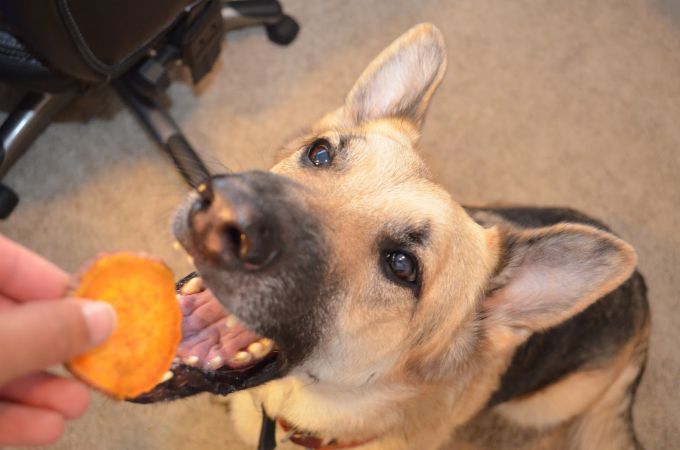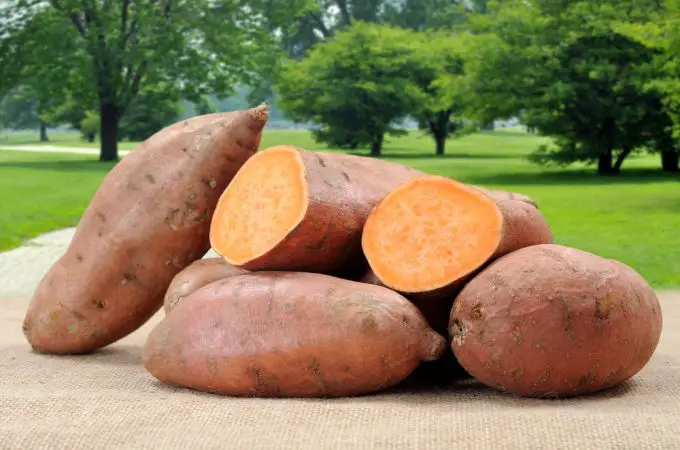Potatoes are delicious, and they are excellent sources of complex carbohydrates. Because they are good for you, are they good for your pet dog as well? Or, are potatoes bad for dogs? Potatoes are healthy foods for dogs, and many dog owners can attest to the fact that this vegetable contributes a lot to your pet’s well-being.
Potatoes Health Benefits
If you want your dog to be healthy and well, then you will be happy to know that potatoes can give various health benefits for your pet. Here is a list of those benefits. Read then and see if they are of some help to your pet’s well-being:
- Fight the effects of aging – As your pet grows old, it will suffer from various ailments, and hamper its physical activities like playing or running. With the nutrients present in potatoes, your dog will have an easier time growing old.
- Prevents constipation – Thanks to dietary fiber present in potatoes, your pet’s stool is loose enough to make the potty time easier for it.
- Protects the canine from disease – Dogs are vulnerable to particular types of cancer that affect canines. The nutrients and minerals in potatoes lowers your pet’s risk of getting cancer. More so, your pet also gains protection against heart disease.
- Regulates fluid balance in the dog’s body – Various fluids in a canine’s body help maintain its well-being. Additionally, potatoes aid in making sure that nerve transmissions and muscle functions of the dog work properly.
- Helps your pet’s digestive system – dogs must digest their food properly so that they break down the various nutrients they need for excellent health.
Are Potatoes Good For Dogs?
Yes, indeed. Potatoes are an excellent vegetable choice to add to your dog’s diet. Whether it mashed, pureed, baked, or boiled; potatoes is a big help to a canine’s health. Many veterinarians will recommend potatoes, along with carrots, cucumber, and other vegetables, to bolster your pet’s immune system and reduce weight gain.
You can serve potatoes as a main meal, mixed with other foods or as a snack. Just make sure that your dog is old enough to eat solid food like vegetables. Puppies do not have the necessary digestion capability for solid foods, so it may cause some harm to them.
Types of Potatoes That Can Dogs Eat
Can Dogs Eat Potatoes? Yes, canines can eat a variety of potatoes. Here below is a list of some potatoes that your pet might find delicious:
- Russet Potatoes – Has a white to pale yellow flesh with a light to medium russet-brown skin. The shape of the vegetable may either be a slightly flat oval or oblong. Russet potatoes contain average sugar content and taste mild earthy. Cooking this potato makes it skin chewy.
- Petite Potatoes – has similar skin, flesh color, texture, shape, and sugar content to an ordinary large potato. However, these are smaller its flavor is more concentrated. Some people refer to them as marble, pearl, or bite-sized potatoes.
- Red Potatoes – As the name of the vegetable suggest its smooth, thin skin is red and while its flesh is white. The potato is small or medium in size with a slightly oblong or round shape. The texture is creamy, waxy, moist and smooth. It contains mild-medium sugar content, and the red potato tastes subtly sweet.
- Fingerling Potatoes – These are shaped like a finger or oblong. A fingerling potato measures 2 to 4 inches long and has a waxy, firm, and dry texture. The skin color can either be purple, red, white, or orange, while its flesh is also the same colors as its skin. It has an earthy taste, but the vegetable can also taste nutty or buttery. Fingerling potatoes contain average sugar content.
- White Potatoes – This type of potato has two colors, tan or white, but its flesh is white. The sugar content of the vegetable is low and it tastes sweet though in a subtle way. The skin of white potatoes is delicate and thin, while its texture is either slightly creamy or starchy.
- Yellow Potatoes – This is the most common potato that everyone uses in most dishes. It has golden or light tan skin, and its flesh is either yellow or golden. Size may either by marble-like or large and has an oblong or rounded shape. It contains an average sugar content, and the vegetables’ flavor is subtly sweet and buttery. The texture is moist, velvety and slightly waxy
- Purple Potatoes – Size is either small or medium and has an elongated or fingerling shape. Purple potatoes can have slightly red skin, deep purple, or blue. The flesh is pink, purple lavender, blue, or white. The vegetable’s flesh is moist and firm, though the Peruvian purple and blue types have a floury texture along with high starch content. It tastes nutty and earthy and has low sugar content.
There are many ways to prepare these various types of potatoes then serve them as a main meal or snacks. You can choose to mash, puree, bake, boil or fry these vegetables and then give them to your pet. Mixing other vegetables with potatoes is also acceptable when feeding canines.
Keep in mind to feed just the right amount of potato to your dog otherwise, it can lead to indigestion. Makes sure that the potato you serve is in bite-sized pieces for your dog to eat and to digest them without any problems.
Why Raw Potatoes Bad For Dogs?
Can dogs eat raw potatoes? No, they can’t. Raw potatoes found to be toxic for canines. In fact, raw and unripe potatoes have solanine a poison that is also present in its stems, leaves, and skin. In case the dog ingests these poisonous parts, it will affect your pet’s nervous system, increase heart rate speed, blur its vision, and cause improper digestion.
Fortunately, it is very rare for dogs to experience this toxicity despite ingesting solanine from raw potato parts. In the event that a canine eats a significant amount of raw unripe potatoes, only then will the solanine become toxic due to the buildup inside its body.
Symptoms of solanine poisoning are confusion, vomiting, lethargy, diarrhea, and weakness. If this situation happens to your pet, take it a veterinarian for treatment.
Are White Potatoes Good or Bad For Dogs?
There are some concerns as to whether white potatoes are suitable for canines. So were going to see whether there is some truth to those concerns.
Pet owners worry about feeding white potatoes because of its glycoalkaloid content. Glycoalkaloids are nerve toxins that have a detrimental effect on the dog’s body as well as the human body.
However, glycoalkaloids are present only in unripe or green parts of potatoes such as the shoots, leaves, and stems. You can avoid glycoalkaloid poisoning by using a ripe potato or by removing the parts that contain the toxin. Also, excessive exposure to white potatoes will make the poison even more potent.
Another concern is that the content of the vegetable can worsen a dog’s physical health problems. The glycemic index of this vegetable is high, and it can cause a dog’s blood sugar level to rise. This high blood sugar level affects diabetic canines even worse. Your pet can suffer from obesity from eating too much white potato. It has a high carbohydrate level which can contribute to the obesity problem. White potatoes can also create or intensify canine yeast infections.
On the other hand, white potato contains kukoamines phytochemicals that can reduce blood pressure in dogs. There are also flavonoids in this vegetable, and they can promote good heart health, bolster the immune system, and protect canines from some types of cancer.
In essence, a white potato has its pros and cons as a doggie meal. As long as you serve your pet ripe, properly portioned and cooked white potatoes sans their shoots, leaves, and stems, it can be a good meal for your pet.
Are Sweet Potatoes Good For Dogs?
Can dogs eat sweet potatoes? Yes, and there are several great reasons that this particular potato is beneficial for canines.
There are minerals and nutrients in the vegetable that can ensure your pet’s health condition. Here is a list of those minerals and nutrients:
- Beta-carotene – This nutrient is necessary for metabolizing Vitamin A, which is essential to your dog’s growth and development. Vitamin A is essential for your pet’s good vision, growth, and muscles. Lack of vitamin A results in bad skin and hair quality and inflicts night blindness on the dog’s eyes.
- Dietary fiber – Maintains your dog’s digestive health and ensures that your pet can metabolize most nutrients it ingests. Dietary fiber can also loosen a canine’s stool for comfortable pooping and will prevent constipation.
- Calcium – Strengthens the teeth and bones of your canine. Feeding sweet potato to successfully weaned puppies help in its teeth and bones growth.
- Vitamin C – This vitamin acts as an anti-carcinogen for dogs. Likewise, Vitamin C can help your pet fight diseases like respiratory infections, cancer, abscesses, kennel cough, and bacterial infections. Bear in mind that too much vitamin C causes chronic diarrhea and other bowel conditions.
- Vitamin D – acts as an essential regulator for balancing phosphorus and calcium in the dog’s body. This vitamin aids in calcium retention, and helps in bone formation as well as muscle and nerve control. Growing pups can benefit from vitamin D’s positive effect on their bones.
- Vitamin B6 – A beneficial vitamin for helping your pet cope with stress and is an excellent regulator for your dog’s moods. Additionally, vitamin B6 is responsible for creating neurotransmitters, proteins, and hormones that act as signal carriers between cells.
- Iron – Produces red blood cells in your pet’s bloodstream. Lack of iron results in anemia; it is when the red blood cells are too few in numbers to carry oxygen. Anemia can eventually be fatal to canines if their bone marrow’s red blood cell production remains low.
- Phosphorus –Phosphorus is a significant component in a dog’s bone. These two minerals both help in bone development, but calcium focuses more on cartilage along with the bone.
- Magnesium – is an essential cofactor when it comes to maintaining electrical balance across the dog’s membranes. This mineral also fulfills the role of being a metabolic agent in your pet’s body. Likewise, more than 300 enzyme systems depend on magnesium to be their catalyst.
- Potassium – Regulates a canine’s nerve impulses, fluid levels and muscle contractions.
- Low Glycemic Index – Or in other words, the sweet potato has less sugar content. The low level of sugar content ensures that your pet’s sugar level is healthy and manageable
Conclusion
The downside of sweet potatoes is that they contain lots of starch. Too much starch will cause canines to gain weight rapidly so avoid feeding your pet too many sweet potatoes.
So can dogs eat potatoes to keep them healthy and well? The answer is yes, however just remember that when serving potatoes be they fried, baked, pureed or boiled do not include any salt or salt-related products and food. Salt is poisonous to canines and ingesting large amounts of it maybe affect the dog moderately, severe or life-threatening.
If your pet is vomiting, lacks appetite, diarrhea, tremors, excessive thirst, urinates too often, and is feeling lethargic, it would be a wise move to bring it to the veterinarian to see if it is suffering from salt poisoning.
Potatoes truly are beneficial foods to both dogs and humans. Since us, people love our pet canines like they were our children so it’s only logical that we give them the best healthiest food money can buy. Remember that a healthy pet is the best kind of pet a dog owner and a family will ever need.
READ MORE:




I have a 6 year old apricot miniature Poodle, and I just bought 2 different varieties of the dark purple sweet potato and 1 garnet sweet potato. I always microwave them anywhere from 8 minutes to 15 minutes depending on the size of the potatoes. When cooked to the right “doneness”, I scoop out a heaping tablespoon of the soft potato and mash it with 1/2 cup of her “Fromm” kibble and she loves it! Just want to make sure these potatoes are good for dogs and I’m on the right track.
Thank you for all of the information!